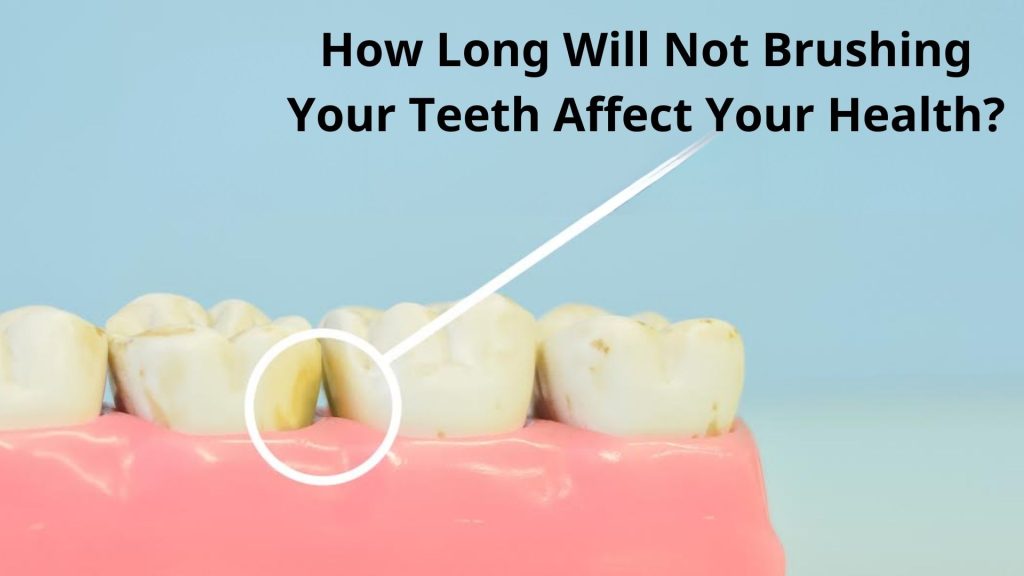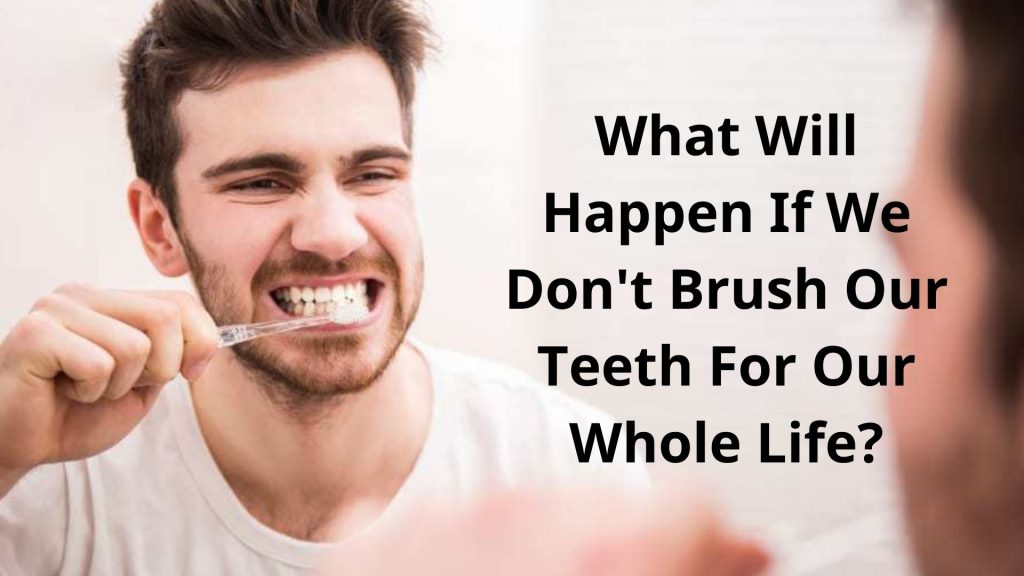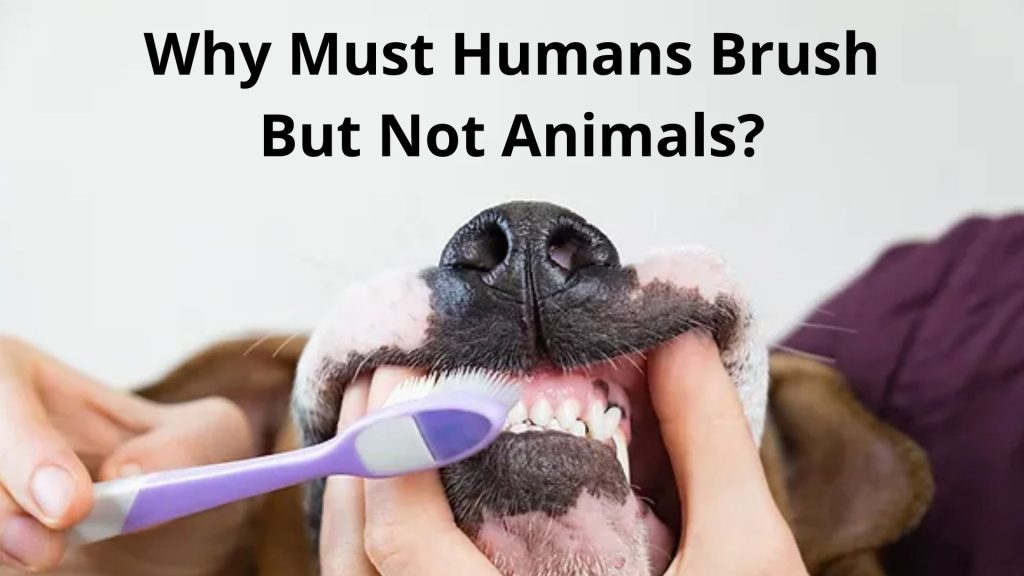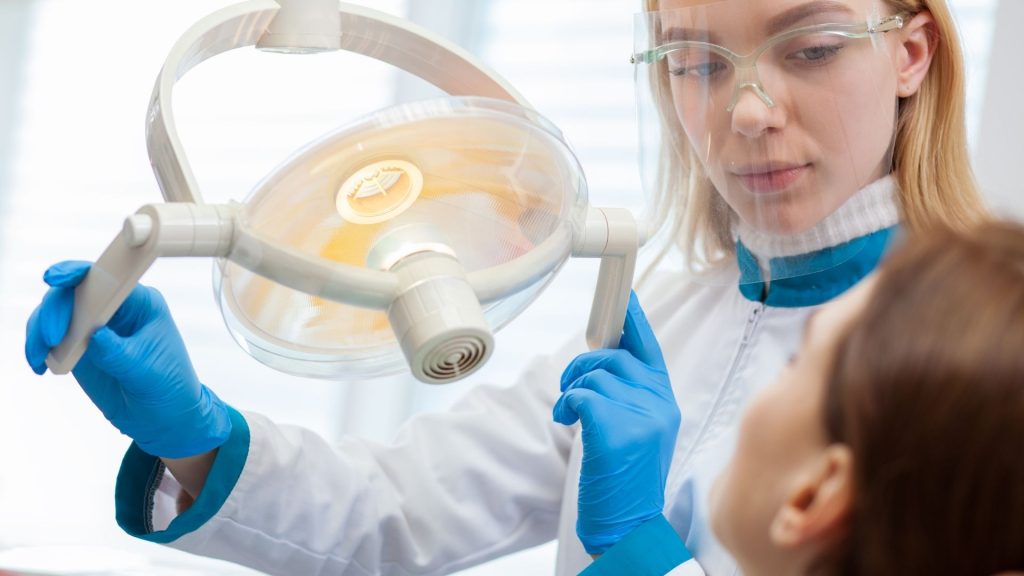What will happen if we don’t brush our teeth for our whole life? Living without brushing your teeth may have major consequences. Oral health care is critical in daily living. However, lifelong tooth-brushing lapses may have received less attention. Let’s see what happens if we don’t have access to dental treatment.
How Long Will Not Brushing Your Teeth Affect Your Health?


Dental practitioners commonly mention 48–72 hours. Without brushing or oral hygiene, tooth plaque and gingivitis may develop fast. Gums that are swollen, red, and bleeding may indicate gingivitis. Remember that dental issues affect people differently. Others are naturally resistant to oral bacteria and may tolerate it longer without much harm.
However, 2–3 days without brushing may be enough to see an influence on dental health.
What Will Happen If We Don’t Brush Our Teeth For Our Whole Life?


Based on Colgate, a range of dental and general health issues might emerge if we do not clean our teeth throughout our lifetimes. Learn about the significant repercussions of not caring for your teeth and why regular brushing is essential:
Dental Problems
Without adequate dental care, major problems might arise. Let’s look at the dental issues that might arise if we don’t clean our teeth and why oral health is so crucial for general wellness:
Tooth Decay
When you don’t clean your teeth or brush too little, tooth decay agents may create ideal circumstances for germs. These bacteria digest food and make acid, which damages tooth enamel. This may cause dental cavities. Untreated dental decay may reach the tooth core, producing pain and suffering. Not brushing your teeth correctly might enable germs to reach the tooth core, causing infection and discomfort.
In addition to teeth, decay may damage dental structures and induce tooth loss. Thus, poor tooth cleaning may cause tooth decay, a frequent and significant dental issue. Brushing every day and seeing a dentist regularly may prevent this problem.
Gingivitis
Dental plaque and bacteria may form on the tooth surface and beneath the gums if you don’t wash your teeth correctly or brush them seldom. If you do this, you might get gingivitis. Gingivitis is a disorder that causes the gums to swell, become red, and bleed readily while brushing or flossing. Dental plaque bacteria irritate gums with acids and breakdown products.
This bacterium may also cause gingivitis with toxins. Without proper treatment, gingivitis may become chronic. Chronic gingivitis causes gum tissue and bone loss, tooth loss, and dental structural deterioration. Poor breath, pain, and social confidence may result from gingivitis.
Halitosis
Everyone, without exception, wishes to escape the humiliation of having bad breath. Plaque and germs in your mouth might stink if you don’t brush. Bad breath not only affects you, but also others around you. That might make you uncomfortable while interacting with other people.
Have you considered the awkwardness of talking to someone with bad breath?
The greatest technique to prevent bad breath and boost confidence is to clean your teeth twice a day for 2 minutes each time.
Tooth Enamel Loss
If you don’t brush and take care of your teeth, the enamel could be lost forever. Mineral loss and cavities can’t get to teeth that have enamel. Since tooth enamel doesn’t grow back, missing it can’t be undone. When you lose enamel from your teeth, they become more sensitive to food and cold and are more likely to get cavities. Teeth that have lost enamel may also look dull and pale. Since this is a long-term issue, regular dental care is needed to protect tooth enamel. Because tooth enamel loss can’t be fixed, protecting tooth enamel is important for long-term oral health.
Body Health
Heart-Related Diseaes
Widespread research links dental health to cardiovascular disease. Gum diseases can happen if you don’t brush your teeth and take care of your oral health. Problems like gingivitis and tooth loss can happen. These issues may lead the body to become hyper-inflammatory, extending to the blood vessels and heart muscle.
When there is inflammation, the body may react by manufacturing white blood cells and other indications of inflammation. These indicators may block and dilate blood arteries, producing excessive blood pressure, cardiovascular disease, and chest discomfort.
Diabetes
Oral health is inextricably related to entire bodily wellness. When we overlook appropriate teeth cleaning and neglect our dental health, various issues may arise, with diabetes being one of the most common. Gingivitis may result from improper plaque removal. An inflammatory disease like gingivitis may cause hyperglycemia, making diabetes harder to treat.
Furthermore, poor dental health might raise a person’s chances of having diabetes in the future.
Respiratory And Pneumonia
Gingivitis and respiratory difficulties may both cause inflammation in the mouth, causing the gums to swell, become red, and bleed readily. Untreated gingivitis may lead to respiratory issues including coughing and trouble breathing, damaging the pulmonary system and causing pneumonia or increasing the risk of respiratory infections.
Furthermore, poor dental health may make social interactions more challenging since foul breath can make you feel self-conscious.
Why Must Humans Brush But Not Animals?


Tooth brushing is an essential oral health care habit for humans, and it incorporates many complicated elements in human life. For numerous reasons, animals do not wash their teeth like humans:
Nutrition And Eating Habits
Different foods and eating habits for humans and animals are the reasons why people need to brush their teeth and animals don’t. The human diet contains a lot of sugar and carbohydrates, which creates ideal circumstances for oral bacteria that cause tooth decay. Bacteria can also grow because of the way people eat, how long they eat, and how many sugary drinks they drink over time.
Furthermore, oral health requires knowledge, socializing, and access to dental care.
Language and Communication
Maintaining good dental hygiene helps ensure a lifetime of successful communication and language use. Communication and confidence might be affected by bad breath or gum issues. This highlights the need to maintain good oral hygiene habits like regular tooth brushing.
However, animals cannot converse like people and convey feelings. They do not clean their teeth to keep their breath fresh or to seem confident in public.
As a result, the capacity to communicate, as well as the consequences of respiration and dental health, are not as important as they are in humans.
Social And Aesthetic Considerations
We wash our teeth for aesthetic and social reasons, but animals don’t.
A gorgeous grin, dazzling white teeth, and a clean mouth are all examples of aesthetics. Oral health affects smile attractiveness and social confidence. A person’s mouth health is also affected by their social environment. A lovely smile and fresh breath may make a good impression in social and business settings. Oral health also affects initial impressions and social interactions.
Animals don’t care about beauty or hygiene since they lack aesthetic and social awareness. For animals, what matters most is food, staying alive, and being safe from natural risks. Thus, animals’ dental health is less important than humans’ in an aesthetically sensitive and normative culture.
Oral Health Awareness
People may take care of their teeth, see the doctor on a regular basis, and deal with oral health issues. Visiting a dentist is an essential aspect of maintaining and enhancing your oral health. They can detect and treat tooth loss, gingivitis, and other oral disorders. They may also offer you advice on how to care for your teeth at home and recommend products. Despite the survival advantages, animals cannot learn about oral and dental health or see a dentist. These animals rely on nature for their oral health and may not always have access to dental care. To make dental treatment easier, we should brush our teeth and maintain good oral health.
How To Effectively Protect Your Teeth?


We often forget how a simple habit, like brushing our teeth, can change our mouth and body health over time. But “If we don’t brush our teeth all our lives, what will happen?” Not taking care of one’s teeth might have major unforeseen effects. Dental issues include but are not limited to cavities, gum disease, enamel wear, and bad breath. These impacts are unpleasant and influence your quality of life, from eating to communicating. We recommend paying attention to oral health. Visit Spring Orchid Dental for appropriate brushing and dental checkups. Our team of professional dentists is dedicated to giving you high-quality dental care that will protect your smile and health as a whole.
Visit us for a healthy smile and a better life.
FAQs
Did People Brush Their Teeth 1000 Years Ago?
Even though we don’t know for sure whether humans cleaned their teeth a thousand years ago, the practice of oral hygiene has been around for at least that long. Many oral healthcare methods have evolved throughout time. Ancient folks cleaned their teeth with aloe vera or tree branches. In certain civilizations, medicinal herbs, natural cleaners, and silk fibers are used to clean teeth. Brushing your teeth with toothpaste and a toothbrush is popular and effective nowadays. We now have revolutionary oral care products and equipment that preserve teeth and gums better thanks to technology.
Why Doesn’t My Kid Want To Brush?
Some kids just don’t like brushing their teeth, whether it’s because of anxiety, discomfort, or a lack of knowledge about why it’s so important. Children’s desire for independence often manifests itself during the teeth-brushing procedure. Getting kids in the habit of brushing their teeth regularly requires teaching them why it’s so essential, making it enjoyable, and setting a good example.
Is It OK Not To Brush Baby Teeth?
No, it is not okay to skip brushing baby teeth. This practice is crucial for preventing cavities and gum issues. Parents should start brushing as soon as the first tooth appears (usually around 6 months old), using a small amount of fluoride toothpaste at least twice a day. This helps maintain oral health and establishes good dental hygiene habits for the child’s future.





